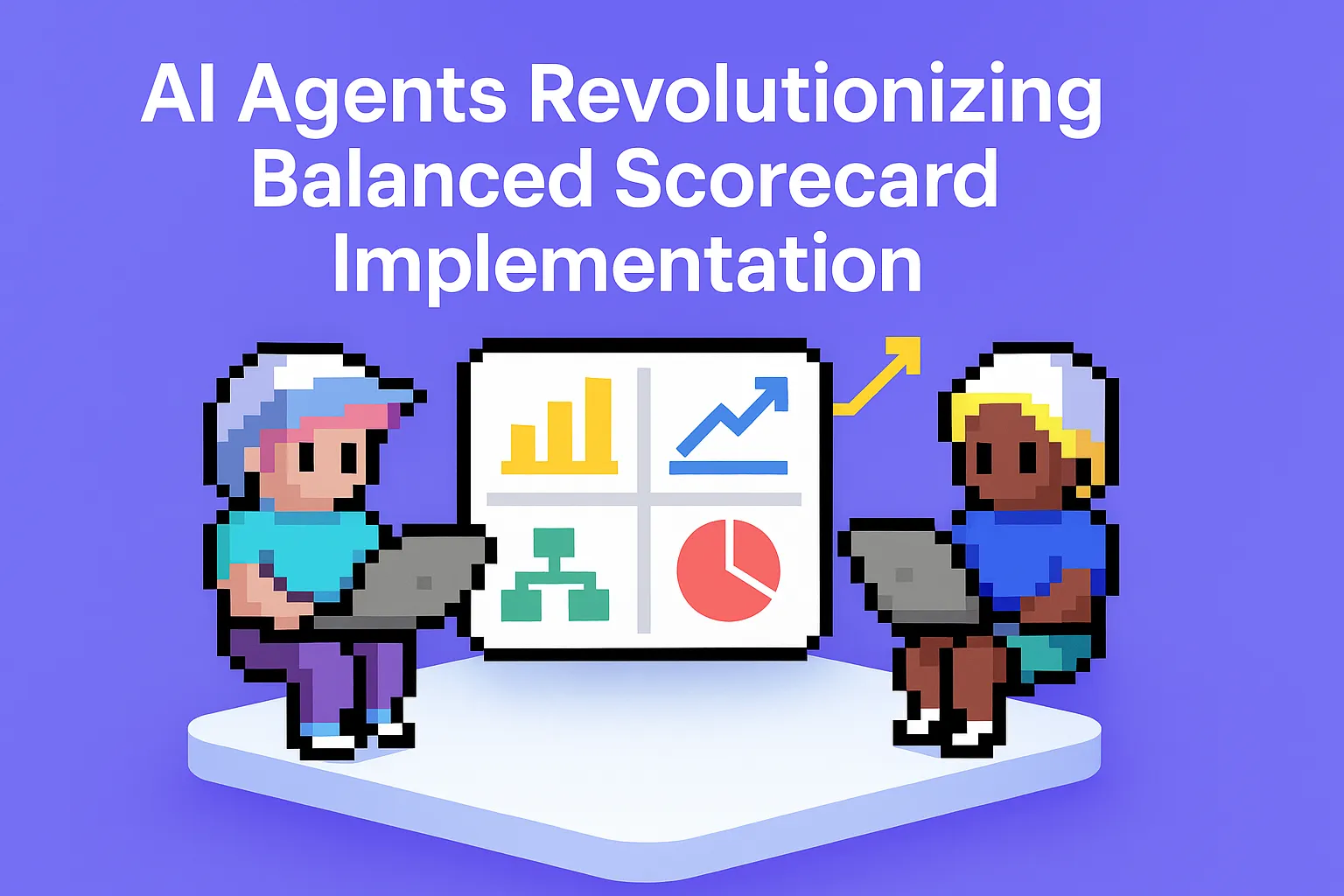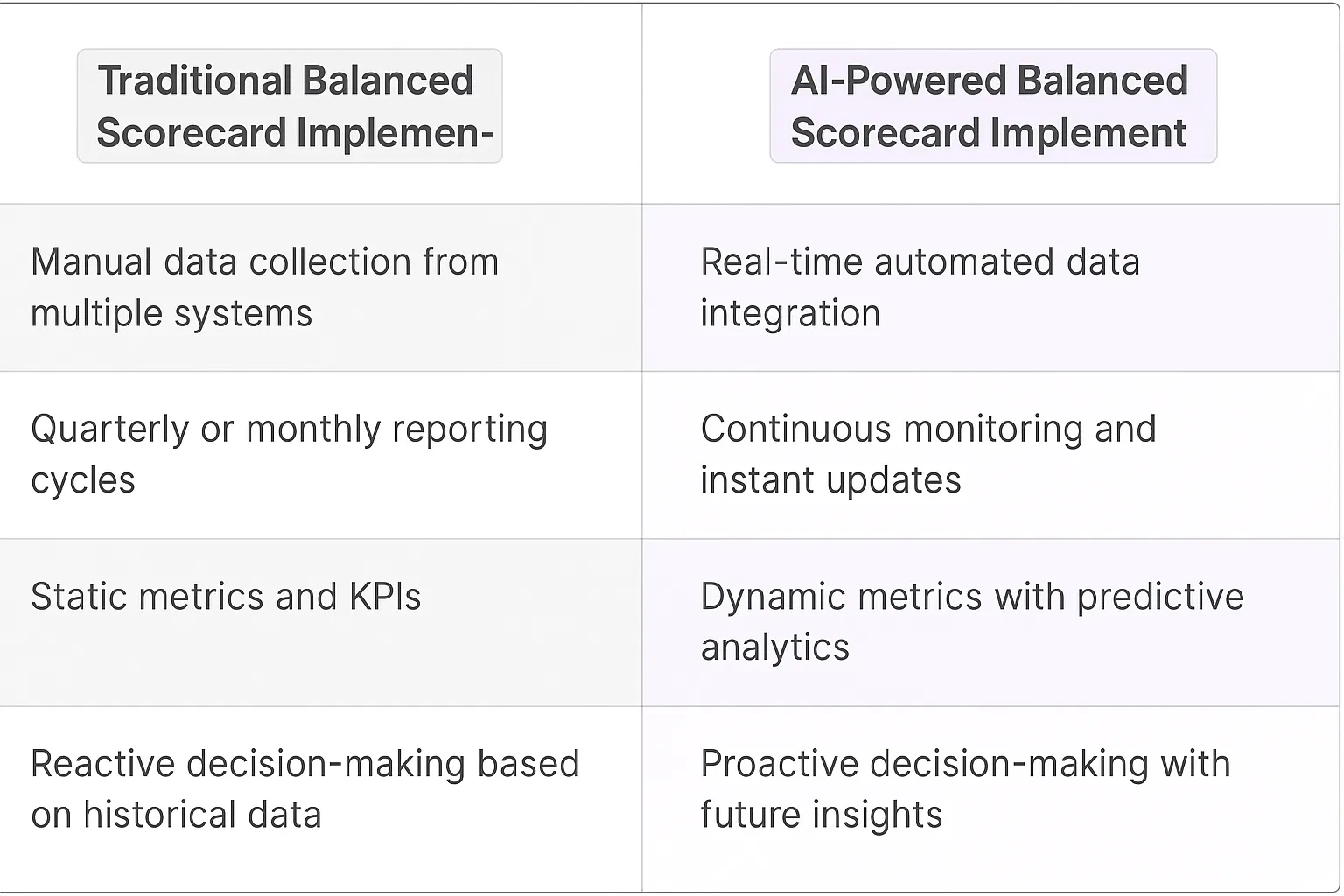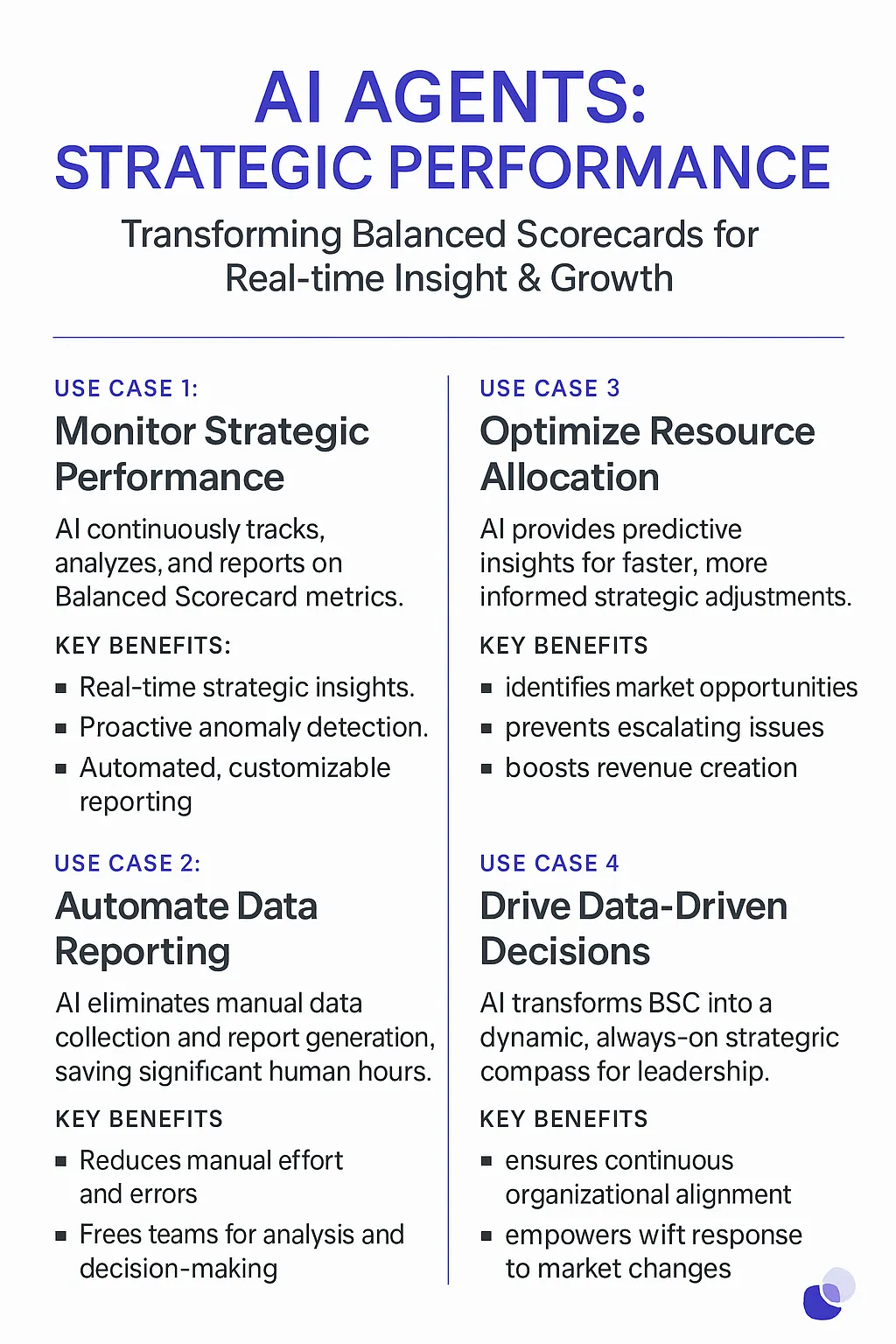Balanced Scorecard Implementation AI Agents
Understanding Balanced Scorecard Implementation
Balanced Scorecard Implementation is a strategic management approach that translates an organization's vision and strategy into a comprehensive set of performance measures. It goes beyond traditional financial metrics to include customer satisfaction, internal processes, and learning and growth indicators. The goal is to provide a holistic view of organizational health and align day-to-day operations with long-term strategic objectives.
Key Features of Balanced Scorecard Implementation
1. Multi-perspective approach: Balances financial, customer, internal process, and learning/growth metrics.
2. Strategy alignment: Links operational activities to strategic goals.
3. Performance measurement: Establishes key performance indicators (KPIs) for each perspective.
4. Cause-and-effect relationships: Identifies how improvements in one area impact others.
5. Continuous improvement: Facilitates ongoing strategy refinement and organizational learning.
6. Communication tool: Provides a clear framework for conveying strategy throughout the organization.
With AI agents, these features are supercharged. They bring real-time data processing, predictive analytics, and machine learning to the table, transforming the Balanced Scorecard from a periodic reporting tool into a dynamic, always-on strategic compass.

Benefits of AI Agents for Balanced Scorecard Implementation
What would have been used before AI Agents?
Before AI agents entered the scene, implementing a Balanced Scorecard was like trying to juggle while riding a unicycle. Companies relied on teams of consultants, endless spreadsheets, and manual data entry. It was a time-consuming process that often resulted in outdated metrics by the time everything was compiled. Managers would spend weeks gathering data, only to find that the insights were no longer relevant. The whole ordeal was about as efficient as using a flip phone in 2023.
What are the benefits of AI Agents?
Enter AI agents - the secret weapon for Balanced Scorecard implementation. These digital teammates are like having a team of data scientists, strategists, and analysts working 24/7 to keep your scorecard razor-sharp. Here's the real deal:
1. Real-time data processing: AI agents can crunch numbers faster than you can say "key performance indicator." They're constantly updating your scorecard, giving you a live pulse of your organization's health. It's like having a financial fitbit for your company.
2. Predictive analytics: These AI agents don't just look at what's happened; they're peering into the future. They can spot trends and potential issues before they become full-blown problems. It's like having a crystal ball, but one that actually works.
3. Customized insights: Every business is unique, and AI agents get that. They learn your company's specific needs and tailor their analysis accordingly. It's like having a consultant who's been with your company for decades, but without the hefty retirement package.
4. Automated reporting: Say goodbye to those mind-numbing hours spent compiling reports. AI agents can generate comprehensive, easy-to-understand reports at the click of a button. It's like having a personal assistant who never sleeps and always remembers to include that one crucial metric your CEO always asks about.
5. Cross-functional integration: AI agents can pull data from various departments and systems, creating a truly holistic view of your organization. They're breaking down silos faster than a wrecking ball at an abandoned warehouse.
6. Continuous learning: These AI agents are constantly improving. They learn from your feedback and adapt to changes in your business environment. It's like having a team member who's always upskilling, without the need for expensive training programs.
The bottom line? AI agents are transforming Balanced Scorecard implementation from a necessary evil into a powerful strategic tool. They're not just making the process easier; they're unlocking insights and possibilities that were previously hidden in the noise of data. It's not about replacing human decision-making - it's about augmenting it with superhuman analytical capabilities. Welcome to the future of strategic management.

Potential Use Cases of AI Agents with Balanced Scorecard Implementation
Processes
AI agents are poised to transform how organizations implement and manage balanced scorecards. These digital teammates can handle complex data analysis, strategy alignment, and performance tracking with unprecedented speed and accuracy. Let's dive into some game-changing processes where AI shines:
- Continuous strategy refinement: AI agents can analyze real-time data and market trends, suggesting adjustments to strategic objectives and KPIs as business environments evolve.
- Cross-functional alignment: These digital teammates can identify and highlight interdependencies between different departments' scorecards, fostering better collaboration and synergy.
- Predictive performance modeling: By leveraging historical data and machine learning, AI agents can forecast future performance across various scorecard perspectives, enabling proactive decision-making.
- Automated reporting and visualization: AI can generate dynamic, interactive dashboards that update in real-time, providing stakeholders with instant insights into organizational performance.
Tasks
When it comes to the nitty-gritty of balanced scorecard implementation, AI agents excel at handling numerous tasks that traditionally consumed significant human resources. Here's where they truly shine:
- KPI data collection and validation: AI can automatically gather data from various sources, cross-verify its accuracy, and flag any inconsistencies or anomalies.
- Objective cascading: These digital teammates can assist in breaking down high-level objectives into actionable goals for different organizational levels, ensuring strategic alignment.
- Performance gap analysis: AI agents can continuously monitor actual performance against targets, identifying gaps and suggesting potential root causes.
- Initiative prioritization: By analyzing the potential impact and resource requirements of various initiatives, AI can recommend optimal resource allocation to maximize strategic outcomes.
- Stakeholder communication: AI can generate personalized performance updates and alerts for different stakeholders, ensuring everyone stays informed and engaged with the balanced scorecard process.
The integration of AI agents into balanced scorecard implementation isn't just an incremental improvement - it's a quantum leap in how organizations manage and execute their strategies. These digital teammates are set to become indispensable partners in driving organizational performance and agility.
As we navigate this AI-powered future, the key will be finding the right balance between human intuition and machine intelligence. Organizations that successfully harness the power of AI in their balanced scorecard implementations will gain a significant competitive edge, able to adapt and thrive in increasingly complex and dynamic business environments.

Industry Use Cases: AI Agents Transforming Balanced Scorecard Implementation
AI agents are reshaping how organizations approach Balanced Scorecard implementation, bringing a level of precision and adaptability that was previously unattainable. These digital teammates are not just tools; they're becoming integral parts of strategy execution teams across industries. Let's dive into some specific scenarios where AI is making waves in Balanced Scorecard practices.
From healthcare to finance, manufacturing to retail, AI agents are proving their worth by enhancing data analysis, facilitating real-time adjustments, and providing insights that human teams might overlook. They're not replacing human strategists but rather augmenting their capabilities, allowing for more nuanced and responsive scorecard management.
What's particularly exciting is how these AI-driven approaches are democratizing strategic management. Smaller companies that previously lacked the resources for comprehensive Balanced Scorecard implementation can now leverage AI to compete with larger corporations on a more level playing field. It's a shift that's quietly revolutionizing how businesses of all sizes align their operations with their long-term goals.
Retail Revolution: Balanced Scorecard AI in Action
The retail industry is ripe for a Balanced Scorecard (BSC) makeover, and AI agents are the perfect catalysts. Let's dive into how a major e-commerce player could leverage BSC AI to dominate the market.
First off, these digital teammates would continuously monitor and analyze vast amounts of data across the four BSC perspectives: financial, customer, internal processes, and learning and growth. They'd spot trends and correlations humans might miss, providing real-time insights to leadership.
On the financial front, the AI would crunch numbers on revenue, costs, and profitability. It might flag that while overall sales are up, profit margins on electronics are shrinking. This prompts a deeper dive into supply chain efficiency and pricing strategies.
For the customer perspective, the AI analyzes customer feedback, social media sentiment, and purchase patterns. It could identify that millennials are loving the new sustainable packaging initiative, leading to increased brand loyalty and repeat purchases.
In internal processes, the AI might notice that order fulfillment times are lagging in the Midwest region. It cross-references this with weather data and local warehouse staffing levels, suggesting targeted interventions to improve efficiency.
For learning and growth, the AI tracks employee training completion rates, skill development, and innovation metrics. It could highlight that teams who completed a new data literacy course are consistently outperforming their peers in key performance indicators.
The real magic happens when the AI starts connecting dots across these perspectives. It might discover that investing in employee data skills (learning and growth) leads to more efficient inventory management (internal processes), resulting in higher customer satisfaction (customer) and ultimately, increased profitability (financial).
This holistic view allows leadership to make data-driven decisions that balance short-term gains with long-term sustainability. The AI doesn't just report numbers; it tells a story, recommends actions, and even predicts potential outcomes of different strategies.
In essence, BSC AI transforms the retail giant from a reactive entity to a proactive powerhouse, always one step ahead of market trends and customer needs. It's not just about measuring performance anymore; it's about shaping the future of retail.
Manufacturing Mastery: Balanced Scorecard AI Reshapes Industry
Let's talk about how Balanced Scorecard (BSC) AI is about to flip the script in manufacturing. I've been tracking this trend, and it's not just incremental improvement - we're looking at a fundamental shift in how factories operate and compete.
Take a global automotive manufacturer. They're not just churning out cars; they're navigating a complex ecosystem of suppliers, regulations, and rapidly evolving consumer preferences. Enter BSC AI, their new digital teammate.
On the financial front, this AI isn't just tallying numbers. It's dissecting cost structures across the entire supply chain, identifying which components are eating into margins, and even predicting future commodity price fluctuations. When it flags that the rising cost of rare earth metals is threatening profitability, executives can make informed decisions about alternative materials or suppliers months before the impact hits their bottom line.
Customer perspective? The AI is parsing through terabytes of data from connected vehicles, social media, and dealer feedback. It might uncover that while overall satisfaction scores are high, there's a growing frustration with the infotainment system among Gen Z buyers. This insight doesn't just sit in a report - it triggers a cross-functional response, from software updates to marketing strategy adjustments.
For internal processes, the AI is the central nervous system of the smart factory. It's not just monitoring production lines; it's orchestrating a ballet of robots, human workers, and automated guided vehicles. When it detects a potential quality issue in the paint shop, it doesn't just raise an alarm - it recalibrates the entire production schedule to minimize disruption while the problem is addressed.
The learning and growth dimension is where things get really interesting. The AI is tracking not just training completion, but actual skill application on the factory floor. It might notice that teams who've completed advanced robotics courses are 30% more efficient at troubleshooting automated systems. This insight drives targeted upskilling initiatives that directly impact productivity.
But here's where the BSC AI really shines - it's connecting dots across all these dimensions in real-time. It might discover that investing in predictive maintenance (internal processes) not only reduces downtime but also significantly boosts employee satisfaction (learning and growth) as workers feel more empowered and less frustrated. This, in turn, leads to higher quality outputs (customer) and lower warranty costs (financial).
This isn't just about measuring KPIs; it's about creating a living, breathing strategy. The AI is constantly running simulations, testing hypotheses, and providing decision support that balances short-term performance with long-term resilience.
In this new paradigm, the manufacturer isn't just reacting to market forces - it's anticipating and shaping them. They're not just building cars; they're crafting mobility experiences, optimizing for sustainability, and redefining what it means to be a modern manufacturer.
This is the kind of transformation that separates the leaders from the laggards. It's not about incremental efficiency gains anymore; it's about reimagining the entire value chain. And for those who get it right, the rewards are exponential. Welcome to the era of manufacturing mastery, powered by Balanced Scorecard AI.
Considerations
Technical Challenges
Implementing a Balanced Scorecard AI Agent isn't just about plugging in some fancy algorithm and calling it a day. It's a complex dance of data, metrics, and organizational nuance that requires serious technical chops.
First off, you're dealing with a massive data integration challenge. Your AI needs to pull from multiple systems - finance, HR, customer service, you name it. Each of these systems speaks its own language, has its own quirks. Getting them to play nice is like herding cats, if the cats were also speaking different dialects.
Then there's the issue of data quality. Garbage in, garbage out, as they say. Your AI is only as good as the data it's fed. And let's be real, most organizations' data is about as clean as a teenager's bedroom. You need robust data cleansing and validation processes, or your AI is going to be spitting out insights that are about as useful as a chocolate teapot.
Don't even get me started on the machine learning models. You need models that can handle the complexity of organizational performance, deal with lagging indicators, and make sense of both quantitative and qualitative data. It's not just about crunching numbers; it's about understanding the subtle interplay between different aspects of the business. Your AI needs to be smarter than the average bear, and building that level of intelligence is no walk in the park.
Operational Challenges
On the operational side, you're looking at a whole different can of worms. First up: change management. Implementing a Balanced Scorecard AI Agent isn't just a tech project; it's a fundamental shift in how the organization thinks about and measures performance. You're asking people to trust an AI with evaluating their work. That's a tough sell, especially for the old guard who still remember when email was the hot new thing.
Then there's the challenge of aligning the AI's outputs with the organization's strategic goals. It's not enough for the AI to spit out metrics; those metrics need to actually drive the right behaviors and outcomes. Get this wrong, and you'll have people optimizing for the wrong things faster than you can say "unintended consequences."
Let's not forget about the skills gap. You need people who can interpret the AI's insights, translate them into actionable strategies, and course-correct when things go sideways. Finding folks with this mix of technical savvy and business acumen is like looking for a unicorn that also knows how to juggle.
And here's the kicker: maintaining relevance. The business world moves fast, and your Balanced Scorecard needs to keep up. Your AI needs to be flexible enough to adapt to changing business priorities, new market conditions, and evolving strategic goals. It's not a set-it-and-forget-it solution; it's a living, breathing system that needs constant care and feeding.
Implementing a Balanced Scorecard AI Agent is a journey, not a destination. It's a complex, multifaceted challenge that touches every part of the organization. But get it right, and you've got a powerful tool for driving performance and aligning the entire organization around what really matters. Just don't expect it to be a walk in the park.
AI Agents: Revolutionizing Strategic Management
The integration of AI agents into Balanced Scorecard Implementation is not just an incremental improvement - it's a game-changer. These digital teammates are redefining how organizations approach strategy execution and performance management. By providing real-time insights, predictive analytics, and continuous learning capabilities, AI agents are enabling a level of agility and responsiveness that was previously unimaginable.
However, this transformation doesn't come without challenges. Organizations must navigate technical hurdles like data integration and model complexity, as well as operational challenges including change management and skills gaps. The key to success lies in viewing AI-powered Balanced Scorecard Implementation not as a one-time project, but as an ongoing journey of strategic evolution.
As we look to the future, it's clear that AI agents will play an increasingly central role in how organizations measure, manage, and improve their performance. Those who successfully harness this technology will gain a significant competitive edge, able to adapt and thrive in an increasingly complex and dynamic business landscape. The future of strategic management is here, and it's powered by AI.













